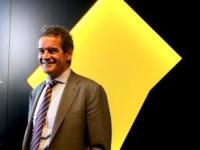Corporations need mavericks for innovation: CBA CIO

Commonwealth Bank CIO Michael Harte has said that workers need to take away time cards and instead be measured on their output in order to fuel innovation in Australia.
Speaking at an Australian Information Industry Association (AIIA) event in Sydney on Wednesday, Harte said something needed to be done to lift Australia's low ranking in the OECD list for the creation of intellectual property.
"There's no reason why the beautiful success of wi-fi can't be replicated 1,000 times," he said. "This is not about CBA or what we might have done … it's about the importance of the wealth and well-being of the country. There's got to be a balance in the way we can invest in the longevity of this innovation."
Harte said that while artists often make discoveries by mistake, and through trial and error, corporations in Australia had fostered a culture where failure was unacceptable.
"We have not created an emotional environment in corporations for that kind of risk taking," he said.
He said that staff don't want to be told to be more creative, or to be more like Google and Apple, but need to be given space to explain how they can improve their role.
"They don't need to read about what Google does to be creative, they just need the corporation to get rid of all the bureaucracy, and rules, and crazy things that we've put in place because we've got to make the place safe. You've got to make the environment unconstrained, and it is simple things like taking away the time sheet, or taking away this cross-departmental payment thing," he said.
He joked that the Commonwealth Bank wasn't the only one to do this, and that telco giant Telstra also had this problem.
"When I talk to Telstra, I talk to five different places. You've got all these rules in place, and it makes people very unproductive and it crushes their creativity," he said.
"Don't try and tell a person to be creative, just try to get rid of all the things that is stopping the person from being creative."
He said people don't seek careers in banking to be creative and risk taking, but that must be a component of the company's culture.
"It's a risk constrained environment. We attract people that are wanting a safe, long career. They don't look for mavericks and troublemakers," he said.
"[But] we've got to create sufficient space for a sufficient number of people so that they can come and have a wonderful career taking risk, pushing the envelope and feeling they have a safe environment in which to do that."
Harte said that one area CBA had encouraged risk takers was in the project to overhaul the company's mainframe.
"We start with 5 percent of our workforce and hopefully bring it to 10 percent. That would be an acceptable number of people to take an acceptable amount of risk," he said. "We've backed guys who spend billions of dollars renovating that horrible old mainframe machinery that was designed to count money for the bank rather than to understand customers. Now I have a machine that can help understand and deepen that relationship with customers.
"We've got enough troublemakers doing that."
